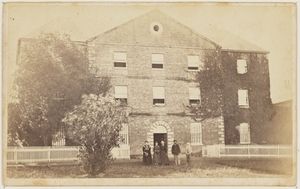
1791 – 60 acres allotted to Surgeon Thomas Arndell on north bank of Parramatta River, east of Rose Hill (Parramatta).
1810 – 150 acres set aside for an Orphan School at Arthur’s Hill encompassing the former Arndell estate.
1813 – Tenders for timber and bricks were called.
1813 – September 24th Governor Macquarie formally lays Orphanage Foundation stone.
1814 – Brickwork and roofing nearly completed on main building.
1816 – Mrs Macquarie appointed Orphanage Patroness.
1817 – School stated to be complete.
1818 – 30th June Government boats deliver 70 girls, and Matron and Master to Orphan School. Governor limits number of girl residents to 100. First extension of east and west wing commenced.
1819 – Site still requires out buildings, bakery and stables.
1820 – Plan of improvements corrected and approved; Francis Greenway to advertise for contracts to construct Matron’s room and school room.
1821 – Mrs Macquarie requests extra improvements including projecting outside caps for school room windows, hut and gardener, and workman’s hut.
1822 – Very little work done on buildings, Watkin to be sued and Mr Smith to estimate cost of completion. Greenway’s services to be dispensed with, and painting and glazing tenders requested.
1823 – Smith presents bill for his completed work. Buildings to be “whitewashed”.
1825 – Insufficient supply of water noted, poor drainage and brick arches said to be dangerous. Pine joinery decaying. Room in east wing adapted to laundry, store converted to washing house and brick wall built in playground. December work said to have “considerably progressed”.
1826 – Payments were made for 2180 ft. of chiselled flagging, the veranda in the rear of the main building, brickwork in the servants’ rooms, stables and corn house, window sills and carpenters’ work.
1827 – Engine House plans prepared by Busby and Brown. Fire in chimney damages roof.
1828 – The “new building” intended to house male and female orphan schools, although the co-educational scheme was not proceeded with.
1829 – Tender for new kitchen and three cells adjoining submitted.
1830 – Repairs to boat house and a tender for a wharf called for. Extensions to the east and west wings were made.
1831 – Dam completed on site. Repairs to cesspool, drain and gutters completed.
1833 – Building referred to as “hansom and commodious”.
1840 – Whitewashing completed on main building.
1850 – Male Orphan School at Cabramatta closes and boys are moved to the Female Orphan School at Parramatta.
1854 – Orphan School Hospital and sheds erected.
1865 – Drill Master’s residence likely to have been built.
1870 – Plans for additions to hospital veranda, bathroom and school rooms submitted.
1877 – Roof stated to be in “bad repair”.
1880 – Master’s residence constructed.
1882 – Forty bed dormitory added to west wing.
1888 – Buildings handed over to department of Lunacy, and become the Parramatta Hospital for the Insane.
1892 – Stable for Medical Superintendent (wooden) shingled and terra-cotta erected.
1893 – Survey of site completed.
1894 – Front porch rebuilt on main building.
1895 – Boat shed and landing area constructed.
1904 – Balustrade added to wings to make two levels. Second storey added to school block.
1905 – Additions to Central block – back stairs added, connecting passageways to both wings.
1907 – Water closet and enclosed veranda to orphan school buildings.
1931 – Second floor added to block adjoining east wing.
1938 – Verandas enclosed.
1954 – Additional level to back stairs block on centre wing to allow for hot water system boiler in shed at its base added.
1975 – The School was listed by the National Trust
1980 – The psychiatric hospital vacates premises.
1995 – The building were formally re-opened as the University of Western Sydney
2012 – Fund the restoration of the East Wing of the Female Orphan School at the University of Western Sydney
References:
Parramatta Correctional Centre its past development and future care. Kerr, J. DPCS, Sydney, 1995
Out of Sight, out of Mind – Australia’s places of confinement, 1788-1988, Kerr, J. S.H. Ervin Gallery,Sydney, 1988
With Just but relentless discipline – a social history of Corrective Services in New South Wales, Ramsland, J. Kangaroo, Kenthurst, 1996
A Merciless Place – the story of Britain’s convict disaster in Africa and how it led to the settlement of Australia. Christopher, E. Allen & Unwin 2010
Parramatta A Past Revealed. Terry Kass et al, Parramatta City Council, 1996
![]() Neera Sahni, Local Studies leader, Parramatta Heritage Centre, Parramatta Council, 2013
Neera Sahni, Local Studies leader, Parramatta Heritage Centre, Parramatta Council, 2013


